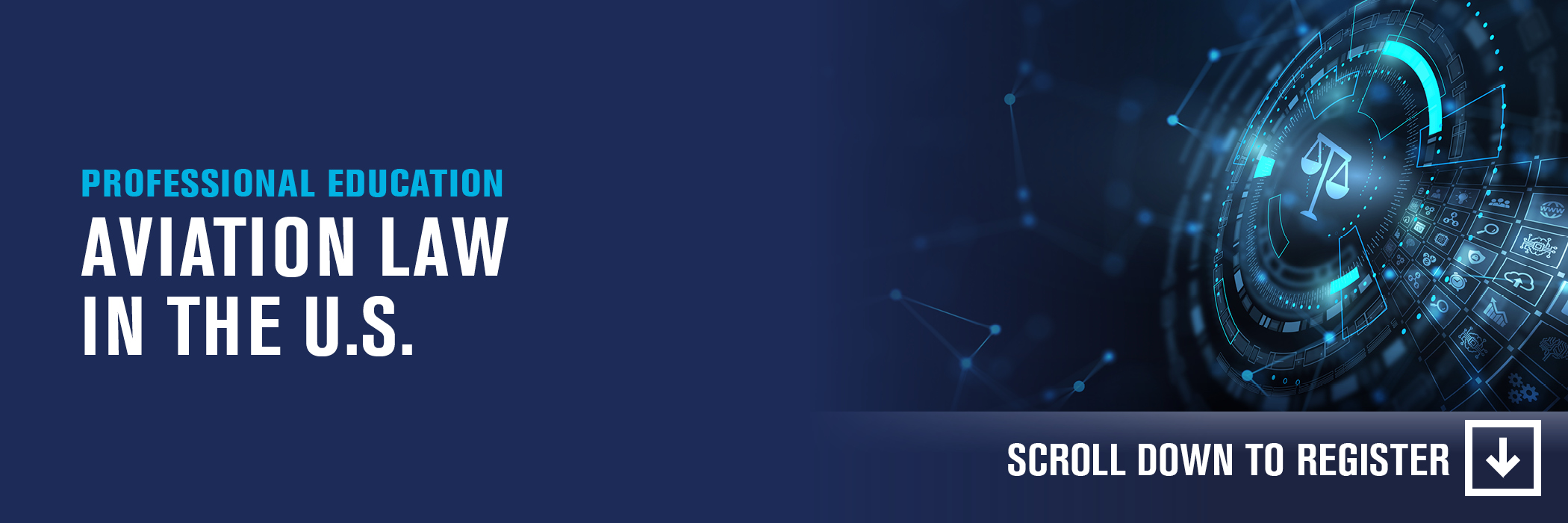Course Detail: OLAW - Aviation Law in the U.S.

Overview
The online and virtual Aviation Law Course, designed by Embry-Riddle Aeronautical University, is part of the U.S. Aviation Law Diploma in partnership with IATA and introduces participants to administrative law and the role of the FAA in the rule making process. Participants will learn about the legal and regulatory environment for those working in the airline industry and understand the role of federal government in addressing problems in the industry. Learners will gain insight into the functions of U.S. Congress, and executive branch agencies such as the U.S. Department of Transportation (DOT) and the Federal Aviation Administration (FAA), and their role in enacting and enforcing laws.
Tailored for non-legal professionals in the dynamic air transport industry, this aviation law short course delves into the intricate legal framework governing air transportation. Participants will gain a comprehensive understanding of the legal landscape as it applies to a number of areas including accident liability, airline crew and passenger protection issues, FAA enforcement, and other important areas. Through an engaging number of interactive sessions, course participants will acquire the knowledge and skills necessary to navigate complex legal challenges in the ever-evolving aviation sector.
The ERAU Aviation Law in the U.S. Course, scheduled for November 3-7, 2025, has been awarded the following approval by The Florida Bar:
CLE Credits
General: 16.0
Certification Credits
Aviation Law: 16.0
The ERAU and IATA short-courses and diploma are not eligible for academic credit toward a degree program, nor do they qualify individuals to practice law or sit for the bar exam.
The Aviation Law course can be taken independently or toward the U.S. Aviation Law Diploma, offered in conjunction with IATA.
Who Should Attend
Because the FAA affects every individual and department, professionals working in various capacities across the aviation industry can benefit from this knowledge including:
- Airline, aircraft and aviation lawyers & legal professionals
- U.S. and International legal counselors & advisors
- Government affairs representatives
- Aircraft leasing and finance executives
- Insurance professionals
- Attorneys
- Lawyers
- Attorneys and lawyers interested in learning more about the growing field of unmanned aerial system (UAS) law
Course Objectives
After completing this course, attendees should be able to demonstrate a broad-based understanding of:
- The framework of DOT regulations which govern Part 121 airline operations
- The framework of FAA regulations
- Crisis Preparation - Preparing for an Incident or Accident
- Aviation Noise
- Dealing with and Understanding a Lawyer from a Law Firm: FAA/DOT, Air Carrier and Corporation Perspective
- Dangerous Goods Carriage, Hazmat Concerns, and Civil Penalties
Continuing Education Units (CEUs)
Embry-Riddle will award 1.5 CEUs to each attendee who successfully completes the course.
Registration Information
The preferred method of payment is credit-card at the time of registration. If you are paying by another method of payment (wire-transfer, employer voucher, check/PO), please 'Create Profile' from the left menu and then contact Daytona Beach ProEd to submit a registration request. Please note registrations are not guaranteed until payment is received in full.
Cancellation Policy
A cancellation charge of $150 will be assessed on any standard cancellations. A late cancellation charge of 25% of the course registration fee will be assessed on cancellations occurring within 14 days of the start of the course. For additional information, please review the detailed cancellation, deferment, no-show and refund policies.
Course Structure - Zoom - Online Access
This online course will be offered live during the scheduled timeframe, between the hours of 1pm to 4pm ET. The course will consist of live virtual sessions hosted in Zoom. It is your responsibility to ensure you can join a Zoom meeting prior to registration. To enable dialogue, access to speakers and a microphone are required and a camera is recommended. Live attendance is highly recommended for all sessions and your undivided attention is required to ensure a successful and rewarding learning environment. The course may require some reading, self-study and research. Sessions will be recorded and available for attendees who could not attend a specific session; the nature of the course is best suited to interactive participation.

 Cart (0)
Cart (0)